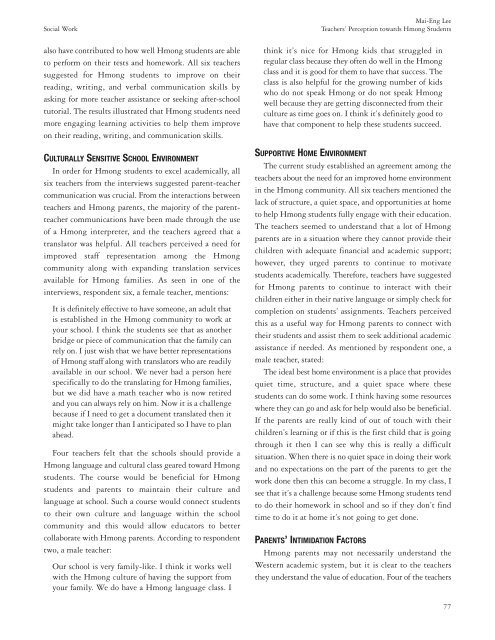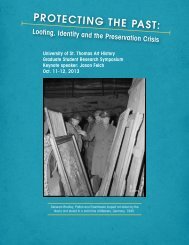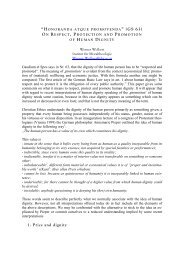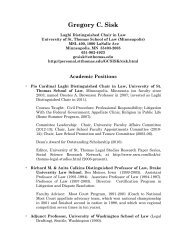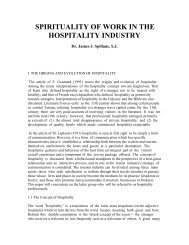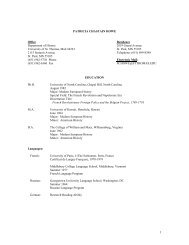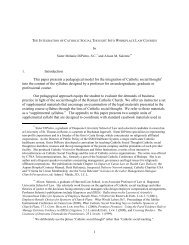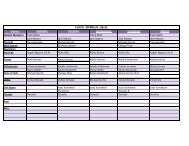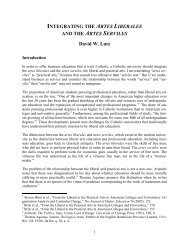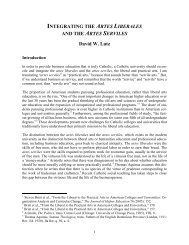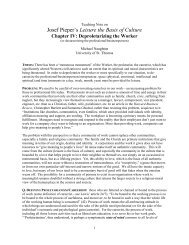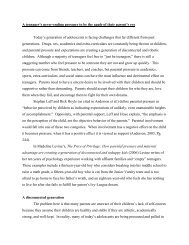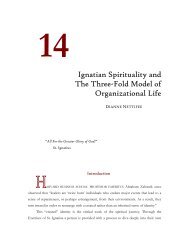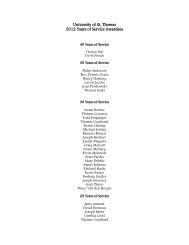dr. ronald e. mcnair acknowledgements - University of St. Thomas
dr. ronald e. mcnair acknowledgements - University of St. Thomas
dr. ronald e. mcnair acknowledgements - University of St. Thomas
Create successful ePaper yourself
Turn your PDF publications into a flip-book with our unique Google optimized e-Paper software.
Mai-Eng Lee<br />
Social Work Teachers’ Perception towards Hmong <strong>St</strong>udents<br />
also have contributed to how well Hmong students are able<br />
to perform on their tests and homework. All six teachers<br />
suggested for Hmong students to improve on their<br />
reading, writing, and verbal communication skills by<br />
asking for more teacher assistance or seeking after-school<br />
tutorial. The results illustrated that Hmong students need<br />
more engaging learning activities to help them improve<br />
on their reading, writing, and communication skills.<br />
CULTURALLY SENSITIVE SCHOOL ENVIRONMENT<br />
In order for Hmong students to excel academically, all<br />
six teachers from the interviews suggested parent-teacher<br />
communication was crucial. From the interactions between<br />
teachers and Hmong parents, the majority <strong>of</strong> the parentteacher<br />
communications have been made through the use<br />
<strong>of</strong> a Hmong interpreter, and the teachers agreed that a<br />
translator was helpful. All teachers perceived a need for<br />
improved staff representation among the Hmong<br />
community along with expanding translation services<br />
available for Hmong families. As seen in one <strong>of</strong> the<br />
interviews, respondent six, a female teacher, mentions:<br />
It is definitely effective to have someone, an adult that<br />
is established in the Hmong community to work at<br />
your school. I think the students see that as another<br />
bridge or piece <strong>of</strong> communication that the family can<br />
rely on. I just wish that we have better representations<br />
<strong>of</strong> Hmong staff along with translators who are readily<br />
available in our school. We never had a person here<br />
specifically to do the translating for Hmong families,<br />
but we did have a math teacher who is now retired<br />
and you can always rely on him. Now it is a challenge<br />
because if I need to get a document translated then it<br />
might take longer than I anticipated so I have to plan<br />
ahead.<br />
Four teachers felt that the schools should provide a<br />
Hmong language and cultural class geared toward Hmong<br />
students. The course would be beneficial for Hmong<br />
students and parents to maintain their culture and<br />
language at school. Such a course would connect students<br />
to their own culture and language within the school<br />
community and this would allow educators to better<br />
collaborate with Hmong parents. According to respondent<br />
two, a male teacher:<br />
Our school is very family-like. I think it works well<br />
with the Hmong culture <strong>of</strong> having the support from<br />
your family. We do have a Hmong language class. I<br />
think it’s nice for Hmong kids that struggled in<br />
regular class because they <strong>of</strong>ten do well in the Hmong<br />
class and it is good for them to have that success. The<br />
class is also helpful for the growing number <strong>of</strong> kids<br />
who do not speak Hmong or do not speak Hmong<br />
well because they are getting disconnected from their<br />
culture as time goes on. I think it’s definitely good to<br />
have that component to help these students succeed.<br />
SUPPORTIVE HOME ENVIRONMENT<br />
The current study established an agreement among the<br />
teachers about the need for an improved home environment<br />
in the Hmong community. All six teachers mentioned the<br />
lack <strong>of</strong> structure, a quiet space, and opportunities at home<br />
to help Hmong students fully engage with their education.<br />
The teachers seemed to understand that a lot <strong>of</strong> Hmong<br />
parents are in a situation where they cannot provide their<br />
chil<strong>dr</strong>en with adequate financial and academic support;<br />
however, they urged parents to continue to motivate<br />
students academically. Therefore, teachers have suggested<br />
for Hmong parents to continue to interact with their<br />
chil<strong>dr</strong>en either in their native language or simply check for<br />
completion on students’ assignments. Teachers perceived<br />
this as a useful way for Hmong parents to connect with<br />
their students and assist them to seek additional academic<br />
assistance if needed. As mentioned by respondent one, a<br />
male teacher, stated:<br />
The ideal best home environment is a place that provides<br />
quiet time, structure, and a quiet space where these<br />
students can do some work. I think having some resources<br />
where they can go and ask for help would also be beneficial.<br />
If the parents are really kind <strong>of</strong> out <strong>of</strong> touch with their<br />
chil<strong>dr</strong>en’s learning or if this is the first child that is going<br />
through it then I can see why this is really a difficult<br />
situation. When there is no quiet space in doing their work<br />
and no expectations on the part <strong>of</strong> the parents to get the<br />
work done then this can become a struggle. In my class, I<br />
see that it’s a challenge because some Hmong students tend<br />
to do their homework in school and so if they don’t find<br />
time to do it at home it’s not going to get done.<br />
PARENTS’ INTIMIDATION FACTORS<br />
Hmong parents may not necessarily understand the<br />
Western academic system, but it is clear to the teachers<br />
they understand the value <strong>of</strong> education. Four <strong>of</strong> the teachers<br />
77


